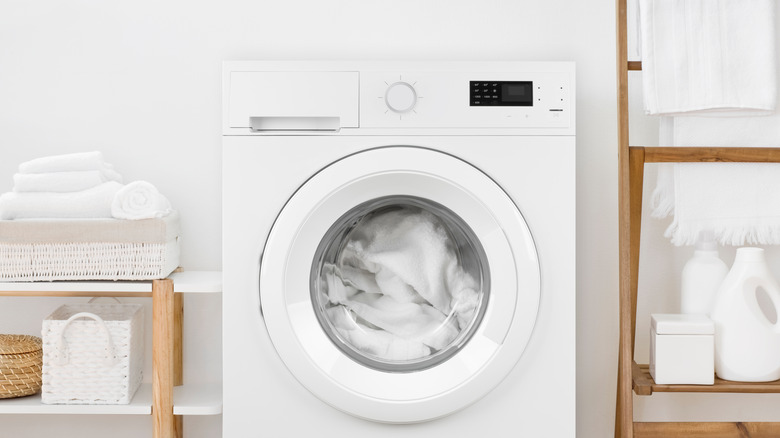5 Eco-Friendly Changes You Can Make To Your Laundry Routine
Did you know that laundry is one of many people's least favorite chores to perform? According to a survey by YouGovAmerica, laundry is tied as the most hated chore along with doing the dishes and cleaning the bathroom. This is probably due to a few factors — for one, cleaning, drying, and folding laundry can be tedious, and it never actually ends; just as you're finishing up one load of laundry, your child can come into the room saying they need a sports jersey cleaned for the next day.
But beyond that, laundry can also be a drain on your utilities, as it relies on heating, electricity, and water. In 2022, Bloomberg reported that U.S. electricity bills hit their highest point in over 40 years. If you're looking for ways to cut down on your environmental footprint and make more economical choices around your household chores, we've got five great eco-friendly switches you can make to your laundry routine.
Let it all hang out
When Americans hear that many European households go without electric laundry dryers, they are often shocked. And who can blame them? Most American households rely on their dryer at least a few times a week. But what if this laundry aid isn't as essential as you think? Hanging clothes to dry does take a little more time, but has several benefits: it reduces your electricity bill, and can even help your clothes last longer, says Rinse. And if you think you don't have the right climate, you'd be surprised how easily you can get clothes dry in your home.
You don't need an outdoor clothesline, though it is nice to have the sun help your clothes to dry. You can also install a hanging rack very easily and affordably with a tension rod, or try out a clotheshorse. Clothes just need to be laid out flat and never stacked on top of each other, and you'll have perfectly dry laundry while making a more eco-friendly choice.
Choose a liquid-free detergent
Did you know that even if you're using a green laundry detergent, it could still be negatively impacting the planet? Liquid laundry detergent is typically made up of 50 to 90% water, says AZ Central. That means that entire gallons of water are being shipped across the country when you've got water sitting right in your pipes. Instead, switching to a dry or powdered laundry detergent is a great way to reduce water waste and your carbon footprint, and it's more economical than laundry pods, which tend to be the most expensive form of laundry detergent, says How Much Is It.
You can go for a green au naturel detergent, or choose a more traditional powdered formula like Tide. There are even laundry strips that you can throw directly into your washing tumbler! There are plenty of options in the liquid-free detergent world for every type of household and budget, and the most important bit is reducing water waste — plus, who wants to pay for water?
Switch to wool laundry balls
If you're still throwing down cash each month for dryer sheets and fabric softener, you're missing out on a great environmentally and budget-friendly swap! Reusable felted wool balls can remove lint, soften fabrics, and reduce drying time. That's what we call a win, win, win. Wondering how these little wool wonders work? According to Cleancult, the tightly wound wool fibers cause friction that softens clothes and keeps them from folding in on each other, thus helping to reduce drying times. Plus, 100% wool products are completely compostable.
While it can seem like a hefty investment at first, with sets costing between $10 and $20, they do end up saving you plenty of cash in the long run when you no longer have to add fabric softener and dryer sheets to your shopping cart. If you miss that special fragrance of softener, consider adding some essential oils to your wool balls. Most pure essential oils won't stain clothing, but check out this guide from Young Living to make sure you won't damage your laundry.
Wash in cold water
Did you grow up hearing that laundry won't get clean in cold water? For a long time, that was partially true. Hot water is great at disinfecting even without the use of soap or detergent, and as reported by the New York Department of Health, boiling water can even kill germs and bacteria. If you've ever tried washing your hands when they have oil on them, you know that using hot water and soap instead of cold water cuts through the grease more easily. But when it comes to washing laundry, hot water has oftentimes become unnecessary.
If your detergent has enzymes in it, hot water can actually break down the enzymes before they are able to clean your clothes, says McGill. This type of detergent, therefore, can actually perform well in cold to lukewarm temperatures. Plus, using cold water can help your garments last longer, especially if you have delicate fabrics or highly saturated hues — hot water can strip these fabrics down and cause the dye to leak. Using cold water reduces energy use and still produces great laundry results. However, if sanitization is the goal, or if there is any bodily fluid like vomit or urine, hot water is still supreme.
Reduce your cycle time
When it comes to choosing the right cycle for your laundry needs, it can be tricky to know which is best. And while some of them can be helpful in cases of sanitization or getting the appropriate amount of water in the tumbler, other times they end up using excess water, heating, and energy. Nowadays, many washing machines offer speed and eco cycles that significantly cut down on washing time. These are great options for small to medium loads of laundry of regular clothing that aren't super soiled, says Choice, especially if you're using a solid enzyme-enriched detergent.
Speed washes can be adjusted to different temperatures between cold, warm, and hot, while eco cycles use significantly less water and heating, but aren't as fast as the speedy modes. Either cycle is a great choice for living a little greener. This environmentally friendly principle is pretty simple — shorter washing cycles mean less water and less energy used, which leads to a smaller burden on the planet's natural resources.





